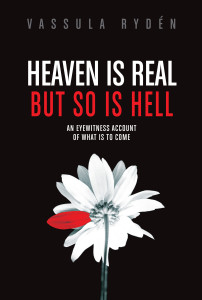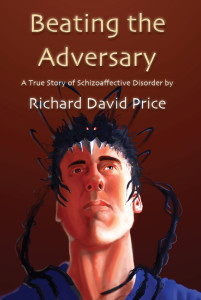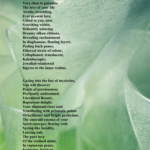Shamanic Sand Painting for Insights
Tides ebb and flow, seasons come and go, and the sun rises and sets.
Nature teaches us about the rhythms and cycles of life.
As a businessman, I’ve enjoyed successes and upturns in the business cycle. But I have also been forced by downturns in the business cycle to cut back my operations here and there and ponder new directions for my business.
The same has been true in my life as well: The natural rhythms of life have caused me at times to be unable to effect changes and break through obstacles. At these times, I’ve had to both be patient and get creative. Sometimes, having to slow down and consider what options might reveal themselves, or work with fewer resources, leads to new ways of doing things. That in turn can lead to insights into even more efficient and effective methods to get things done.
During a downturn in any cycle, when growth has halted, formerly unseen options can reveal themselves. It’s important not to become frustrated and simply try harder at doing the same thing we have always been doing out of fear that nothing will grow or flourish again. If we aren’t getting results, it may be that we need to accept we are in a fallow period or a downturn, and the time for pondering, reflecting, or envisioning something new is at hand.
Resisting a natural downturn in a cycle can cause anxiety as you continue to press forward only to see that your efforts aren’t paying off. Holding on when you need to let go can cause you to miss new, better opportunities that are right in front of you or about to show up in your life as the wheel turns and a new season of growth begins.
Sometimes, you have to let go to move forward into something even better—a situation, a relationship, or a project. Accepting a downturn in a cycle gives you the opportunity to question that which has remained unquestioned, and ask, “Is this necessary? Am I directing too much time, energy, and money toward something that isn’t working for me? Was it working once, but no longer? Is it time to establish a new habit, and focus on something else?”
It might be that you have to learn to work smarter instead of working harder and to change the way you operate. It might also be that you need to open your eyes to new resources and bring in new energies.
When you are in a downturn in your life, you might use the practice of sand painting to gain insights. A Jungian sand tray is a technique similar to shamanic sand painting. Both help you access the wisdom of your unconscious mind. However, unlike the Jungian technique, a shamanic sand painting is typically created outdoors. Let your intuition guide you to a place in nature where you can create your “painting,” a small area on the ground or perhaps a tree stump on which you can lay natural items.
 Gather sticks, leaves, stones, and other natural items to represent the story of your life in the present moment. Again, let your intuition guide you, choosing items and arranging them without thinking about what you are doing.
Gather sticks, leaves, stones, and other natural items to represent the story of your life in the present moment. Again, let your intuition guide you, choosing items and arranging them without thinking about what you are doing.
When it feels as if your sand painting is done, sit for a time observing it. Notice what feelings and thoughts come to mind and what insights arise.
If you like, after you’ve completed your sand painting, return to it on another day and see what changes nature has wrought.
What has been moved, and what has been brought into your painting? What does the painting now say about your life and its rhythms?
In nature, nothing remains the same, and for good reason. After a forest fire, new growth can begin because the trees that blocked the sunlight have burned away, offering seedlings and brush a better chance of receiving the light they need. After a flood, soil can be enriched with nutrients that support new plant growth. Trusting that with endings come new beginning and with losses come gains will help you through the downturns in the cycles of life.
You will find yourself more in synch with natural rhythms when you let go of the fear of loss. Whether you worry about not having enough money, not finding a good job, or not attracting a romantic partner who emotionally supports you, you can look to nature to inspire you to trust in life’s rhythms and engage in the process of letting go of the past and creating something new. And you can use the sand painting technique to better understand how to use a downturn as an opportunity for positive transformation.
Resistance to natural rhythms wastes energy and creates emotional and mental stress. Sometimes, you may be afraid to let go of something because you fear that the loss will be irreplaceable. And if you let go of something tangible, such as a house, a second car, or a side business, you can become gripped by the fear that you will never be able to achieve that thing again and that the loss will be felt deeply, for a long period of time. Yet if you find the courage to let go, you may well find that something better comes along. Perhaps nature’s alteration of your sand painting will suggest what you might let go of and what might replace it.
Is there something in your life that you used to think was essential but now might need to let go of? What is it, and when did it stop being essential for you? Why do you no longer need it? Can you accept that the rhythms of life have determined it is time to let go? And can you trust that something new will come in? Can you identify an opportunity or resource that you’ve overlooked and might now take advantage of?
 Carl Greer, PhD, PsyD is a practicing clinical psychologist, Jungian analyst, and shamanic practitioner. His shamanic work is drawn from a mix of North American and South American indigenous traditions and is influenced by Jungian analytic psychology. He has worked or trained with shamans on five continents and trained at Dr. Alberto Villoldo’s Healing the Light Body School, where he has taught. Carl Greer is involved in various businesses and charities, teaches at the Jung Institute in Chicago, is on the staff of the Lorene Replogle Counseling Center, and holds workshops on shamanic topics. He is the author of the new book Change Your Story, Change Your Life: Using Shamanic and Jungian Tools to Achieve Personal Transformation by Carl Greer © 2014, Findhorn Press.
Carl Greer, PhD, PsyD is a practicing clinical psychologist, Jungian analyst, and shamanic practitioner. His shamanic work is drawn from a mix of North American and South American indigenous traditions and is influenced by Jungian analytic psychology. He has worked or trained with shamans on five continents and trained at Dr. Alberto Villoldo’s Healing the Light Body School, where he has taught. Carl Greer is involved in various businesses and charities, teaches at the Jung Institute in Chicago, is on the staff of the Lorene Replogle Counseling Center, and holds workshops on shamanic topics. He is the author of the new book Change Your Story, Change Your Life: Using Shamanic and Jungian Tools to Achieve Personal Transformation by Carl Greer © 2014, Findhorn Press.
Read an extract and purchase from Findhorn HERE
Please note all royalties are being donated to charity
Now also available at Amazon.co.uk, Amazon.com and BarnesandNoble.com



 The Book
The Book





